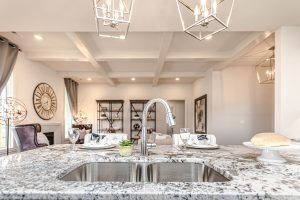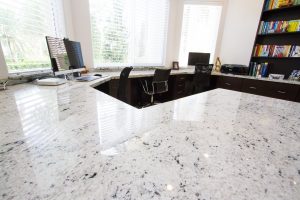Blog
Is Marble Suitable For Use in The Kitchen
Marble has long been the stone of choice for many builders and interior decorators for high-end homes and businesses. There is a reason why so many sculptures such as Aphrodite of Milos and David by Michelangelo were carved from this type of stone. It is known for its beauty, strength, as well as its durability to stand the test of time. But can you really use marble in your home kitchen? The short answer is YES, yes you can.
Of all the stones that can be used in your kitchen, marble is the most desired. It is formed in nature and has unique and dramatic swirls and veins that are best displayed in large section. This makes marble great for large countertops and vanities.
Marble is suited for kitchen use but it also requires proper care and maintenance to avoid scratches, wear, and chips. If you’re willing to put a little extra care into maintaining your marble countertop then it will last you a lifetime and then some.
How Is Marble Formed
When limestone, a sedimentary rock, gets buried deep in the earth for millions of years, the heat and pressure can change it into a metamorphic rock called marble. Marble is strong and can be polished to a beautiful luster. It is widely used for buildings and statues. As you can see from the picture, marble has a very sparkly luster. It occurs in many different colors such as white, pink, gray, red, yellow, or black.
Because mare occurs naturally in very large deposits it is also mined in large sections. This makes it perfect for covering large surfaces such as countertops as they can be cut from one large singular stone. Each slab is unique with no 2 sections having the same pattern. This way you are guaranteed to not see your marble countertop pattern in any other kitchen.
What Are the Types of Finishes For Marble Countertops?
Like most natural stones, marble has to be finished to complete the installation process and help preserve the stone from wear and tear. Marble finishing also helps bring out the naturally occurring patterns in the stone. There are three primary types of marble countertop finishings including: polishing, leathering, and honing.
Polished Marble Countertops
A polished marble finish is created by grinding down the surface of the material using fine abrasives until it results in a natural shine. It is layered with an end coating that acts as a protectant and gives off a smooth and “mirror-like” shine.
When you think of kitchen countertops, polished finishes are probably what come to mind. They offer a glossy look that adds elegance to a room. The shiny finish makes the countertop always appear clean and dirt-free. It is a great addition to traditional or modern homes that boast extravagance and luxury
Leathered Marble Countertops
Leathered marble has a surface that is textured and pebbly, like leather. This type of finish is achieved by further processing the stone through sanding and buffing, sometimes using brushes and water jets. This finish can be put on darker marbles to bring out a rich texture.
Honed Marble Countertops
Honed marble has a matte finish that varies from completely flat to semi-matte, which is a bit more forgiving when it comes to scuffs and scratches, and “dresses down” the feel of the marble so it’s softer and warmer, rather than pristine and sterile.
Maintaining Your Custom Marble & Granite Connection Marble Countertop
Designers have been known to refer to marble as the “blue jeans of countertops” – they show the wear and tear of life, but that’s also what gives them their character. It’s true that keeping marble pristine requires some extra TLC; but some homeowners have found that perfection isn’t all it’s cracked up to be. The etches, the scratches, the stains, and splatters all tell the story of your family and how they use and love the kitchen. And other homeowners find that with the natural swirls and beautiful unpredictability of the marble’s veining patterns, the stains and scratches nearly disappear into its surface.
Seal Your Countertops Regularly
Sealing your countertops will help them repel water, but isn’t a guarantee against staining. It’s generally advised to have your marble professionally sealed to start with, but you can get a sealer to apply yourself when it comes time to reseal, which is usually every 3-6 months. Darker marble can go longer between sealing, whereas white marble needs more frequent upkeep.
Wipe Up Spills Immediately
Don’t let water pool on the stone, or you run the risk of stains, etches, or water damage.
Do Not Use Harsh Chemicals or Abrasive Cleaners
Stick to PH-balanced cleaning solutions, since acid will cause etching on your marble, and use a soft cloth when cleaning, to avoid fine scratches. Hot water and a soft towel are the best tools, but you can also disinfect your countertops once a day by sprinkling baking soda on the surface and gently rubbing it with a damp cloth.
Avoid Placing Hot Pots on The Surface – Use Cutting Boards and Coasters.
Avoid setting food, plates, utensils, or hot pots and pans directly on your marble – doing so can stain, etch, or scorch the stone. Never cut directly on your marble countertops, as you run the risk of scratching it with your knife – and, in the case of raw meat, leaving behind a place for bacteria to collect and multiply.
Contact Marble & Granite Connection for the Best Custom Marble Countertops in Pompano Beach and South Florida
Marble & Granite Connection has been providing quality services to countless patrons across Broward and Palm Beach County for many years. We have been able to satisfy our customers with high-quality marble countertop installation. Contact us today for marble countertop installation services near me, We promise you that you’ll be added to our growing list of satisfied customers. For any inquiries, you may call us at 954-783-2118 or visit our contact page.

